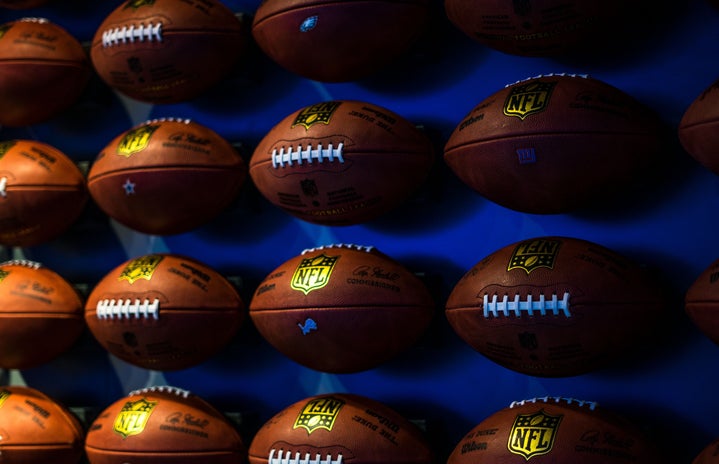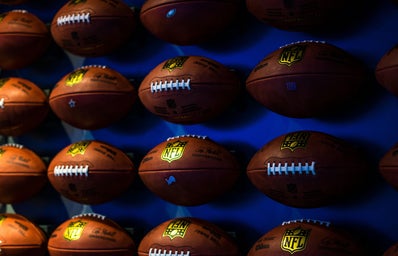If you go on ESPN right now, you’ll find scheduled games for the MLB, the NFL, the NBA, the NHL, the MLS, European Futbol, and CFB. In other words: sports are officially BACK. However, this season is different from past seasons. Not only because there are no raging fans at the stadiums, it’s also different because for the first time in the history of sports, almost every team and athlete is using their voice to talk about social change. Due to the recent killings of George Floyd, Breonna Taylor, and many others at the hands of police officers, there’s been more support for the Black Lives Matter Movement amongst the leagues than ever before. Unfortunately, this hasn’t always been the case.
Let’s take a look back at 2016. On August 26, San Francisco 49ers quarterback, Colin Kaepernick, sat down during the national anthem before their pre-season game against the Green Bay Packers. He addressed the media a few days later explaining that this was his way of peacefully bringing awareness to police brutality and racial injustices in this country. This peaceful act became one of the biggest controversies in sports. There was a lot of support for his movement, but there was also a lot of backlash and misinterpretation of his gesture. Former Seahawks long snapper, Nate Boyer, even wrote an open letter in the Army Times discussing his feelings about all of this. After a conversation with Boyer, a former army vet, he suggested that Kap takes a knee during the anthem, that way, he still “shows respect” for those who fought for this country, while also making his point across.
On September 11, the beginning of the 2016 football season, many players joined Kaepernick and kneeled during the national anthem. Many people started to notice and some had a lot to say including Trump, who said “Kaepernick and other players protesting during the national anthem should leave the country”. On the other hand, Kap got a lot of support from many people, including former President Barack Obama. His protest started a nation-wide movement, however, this came at a very heavy price for him. He only started in 11 games and decided to opt out of his contract by the end of the season. He believed that was being blackballed (excluded and not being able to participate) by NFL owners. He hasn’t played a professional football game since January 1, 2017, but his activism and his message didn’t stop there.
During the 2017 season, players continued to kneel, including Cleveland Browns tight end Seth DeValve, the first white player to join the movement. Many stood by Kap’s side, which sparked a huge nation-wide divide, especially since Trump tweeted that any player kneeling during the anthem should be fired. That comment backfired for him since that same week, there were huge protests within the league. NFL players, coaches, and team owners took a knee and interlocked arms to show solidarity during the anthem, the Seahawks and the Titans stayed in the locker room, several Miami Dolphins wore shirts saying #IMWITHKAP, and several members of the Philadelphia Eagles rose their firsts while kneeling. The best part: the movement spread to other sports as well as social media.
The hashtag #TakeaKnee began trending on Twitter. Stephen Curry, Golden State Warriors’ star, announced that he would not be visiting the White House with his team, a tradition the NBA champions always do, since he didn’t agree with what Trump was saying about Kap and the other NFL players. After Trump decided to tweet a response to Curry’s comment, players around the NBA, including LeBron James, Kobe Bryant, and Chris Paul took to Twitter to show their support for Curry’s decision. After this confrontation, many athletes began to use their social media platforms as ways to talk about racism and social change in the country. As for the movement spreading to other sports: Bruce Maxwell, a rookie catcher of the Oakland Athletic, became the first player in the MLB to kneel during the national anthem. Before the WNBA finals, the LA Sparks stayed in the locker room while the Minnesota Lynx stood with their arms linked. Tampa Bay Lightning forward, J.T. Brown was the first NHL to raise a fist during the national anthem. As the season progressed, more and more players joined. This same year, Colin Kaepernick became part of the cover of Time Magazine’s person of the year.
In 2018, before the beginning of the season in mid-May, owners ruled that players could no longer kneel during the anthem without being subject to punishment. They allowed them to remain in the locker room during the anthem instead. Just a few days before the 2018 season, on September 3, Nike announced that Colin Kaepernick would be the new face of the Just Do It campaign, and a couple days later released an ad featuring him. This ad sparked controversy, once again, and a lot of conservatives went to Twitter saying “Nike just lost a customer” and posted videos burning their Nike apparel. On the other hand, he got support from other athletes, including tennis superstar Serena Williams. However, during the 2018 season, while protests were continued by some players, like Kenny Stills, Albert Wilson, and Eric Reid, it wasn’t as widespread as the previous season, mainly because of the agreement between the league and the players that happened during the pre-season. That ad was later named outstanding commercial at the Emmys.
Flashforward to this year: After the murder of George Floyd, a few NFL players, including MVP Patrick Mahomes, Saquon Barkley, and OBJ, released a powerful video asking the league to listen and speak up. On June 6th, the NFL’s Commissioner, Roger Godell, released a video admitting that he was wrong and apologizing for not listening. On opening night, teams across the NFL chose to stay in the locker room for both the Star-Spangled Banner and Lift Every Voice and Sing, commonly known as the Black national anthem. This year, coaches, players, and full teams are more vocal about social injustice in this country than ever and they owe it all to the man that started it all: Colin Kapernick. He had the courage to kneel, he continued despite getting threats from the public and within the league, and even after losing his job, he remained a voice for those who didn’t have a platform. He truly is an inspiration and the start of the movement within sports. I hope the leagues continue to listen to their players and keep on shining the light into the injustices that go on in this country.


